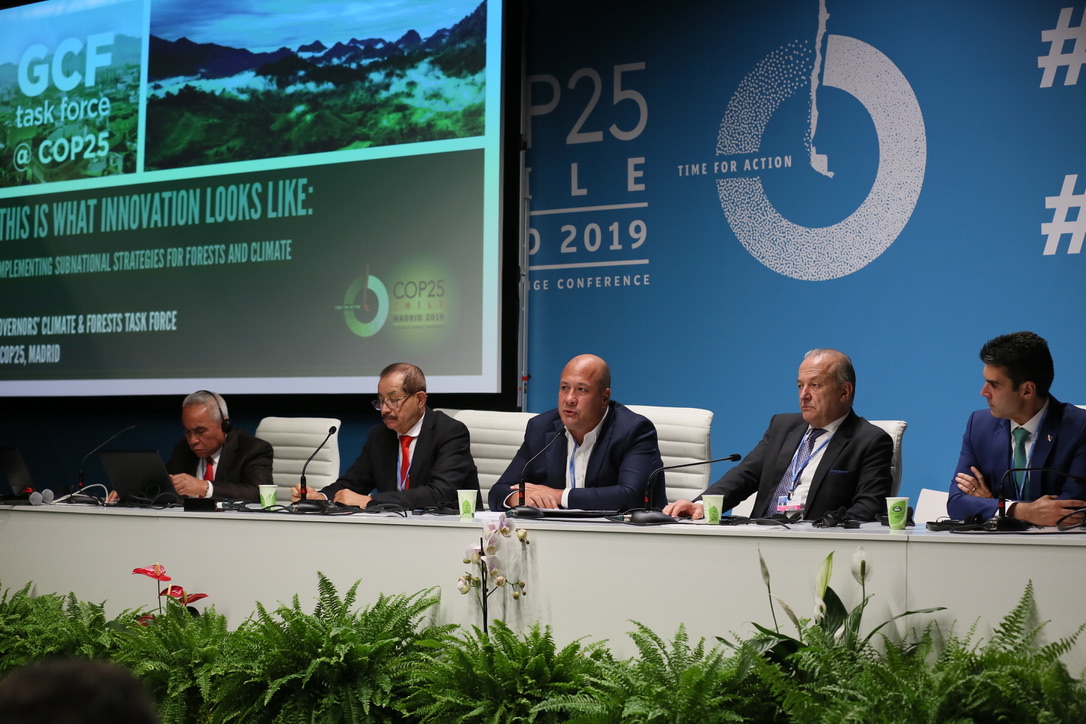(MADRID, SPAIN) The Governors’ Climate & Forests (GCF) Task Force—the world’s largest subnational collaboration of states and provinces working to protect tropical forests, reduce deforestation and forest degradation, and promote realistic pathways to forest-maintaining development through direct partnerships with subnational governments, civil society, the private sector, indigenous peoples and local communities—held an Official Side Event at COP25 in Madrid. The side event examined innovative subnational leadership by exploring how governors from Brazil, Indonesia, Peru, and Mexico are implementing innovative forest and climate solutions in their states and provinces on their own, together, and with the support of key partners of the GCF Task Force like the Norwegian Minister of Climate and Environment, the Tropical Forest Alliance, and the GCF Task Force Global Committee for Indigenous Peoples and Local Communities.
Increasingly, subnational governments are being recognized for their pivotal role in addressing drivers of deforestation and climate change through programs and policies implemented on a jurisdiction-wide level. State and provincial governors in tropical forest regions must make hard choices on how to best safeguard their forests while considering the needs of their people, many of whom feel the effects of poverty, fires, droughts, and climate-related natural disasters. To this end, Governors are focusing their efforts on programs and policies aimed at improving livelihoods by increasing sustainable agricultural productivity, green investment, market integration for smallholder producers, local participation, and accountability. Governors’ commitment to integrating forest protection and climate change mitigation with poverty eradication and economic development played a central role in the discussion at the side event and all other GCF Task Force-supported events throughout the week. Participating governors emphasized the role of subnational collaboration within and beyond their regions, partnerships and alliances with the private sector, the need for international financing to support forest protection and reforestation efforts, and the invaluable role that indigenous peoples and local communities play in protecting forested lands. Governors recognized the GCF Task Force network for cultivating alignment and collaboration between member states and provinces, partners, and private sector organizations on these targeted efforts to combat climate change and deforestation.
Quotes from Participating Speakers
“Subnational level is fundamentally necessary to reach our goals when it comes to addressing climate change and the preservation of nature… Between 50-80% of the mitigation strategies necessary to address climate change needs to happen at the subnational level.”
—Ola Evestuen, Minister of Climate & the Environment, Norway
“The parts of the Amazon that are not protected by law are protected by the attitudes, passion and initiatives of the local communities… In spite of our seasonal extremes, growing levels of deforestation and increasing wildfires, there is a commitment to mobilize and show the world infinitely greater results.”
—Governor Waldez Goés of Amapá, Brazil
“We are trying to use valuation and alliances with Rainforest Alliance for zero deforestation in association with avocado plantations.”
—Governor Enrique Alfaro Ramírez of Jalisco, Mexico
“Reforestation should be viewed as a business—that’s one of the keys of environmental protection in the world.”
—Governor Pedro Bogarin Vargas of San Martín, Peru
“The Ucayali group has the goal of planting 50,000 hectares. We have an agreement with a view towards 2050 but we need both technical and financial support to engage in sustainable development.”
—Governor Francisco Antonio Pezo Torres of Ucayali, Peru
“The key to successful implementation of FCPF-CF emission reduction program is the establishment of good partnerships with actors in reducing emissions, namely the private sectors in the field of plantations and forestry, and the indigenous peoples and local communities in and around the forest”
—Governor Pak. Isran Noor of East Kalimantan, Indonesia
“We need to take the people who live in the rainforest into consideration. Nobody has better expertise and traditional knowledge than the local people who live in the Amazon.”
—Governor Wilson Lima of Amazonas, Brazil
“Approximately 49% of our population lives at the threshold of poverty—we need to improve the conditions of those who live in the forest through creating sustainable forest product practices that support these local communities in order to protect tropical forests.”
—Governor Wilson Lima of Amazonas, Brazil
“In spite of our seasonal extremes and increasing burnings but there is a commitment to mobilize together and show to the world infinitely greater results.”
—Governor Waldez Goés of Amapá, Brazil
“Industrial countries need to cut down emissions and pollution. The countries that have forests will conserve those forests, while maintaining productivity and maintaining profit.”
—Governor Pedro Bogarin Vargas of San Martín, Peru
“Increasing accountability and sustainability in cattle production with land regulation, access to credit, and conditions that can improve the growing and breeding conditions, will bring more value to the finished product.”
—Governor Helder Barbalho of Pará, Brazil
“Over the last 3 years, we have tripled grain production, while decreasing deforestation by 50 percent.”
—Vice Governor Otaviano Pivetta of Mato Grosso, Brazil
“We endorse and are united with Governors from the Amazon region.”
—Vice Governor Otaviano Pivetta of Mato Grosso, Brazil
“The indigenous brothers are those who best preserve the forests and the water…. We must identify ways for greater involvement of these indigenous brothers in the conservation and development of forests.”
—Governor Oscar Altamirano Quispe of Amazonas, Peru
See all photos from the Governors Panel here.

